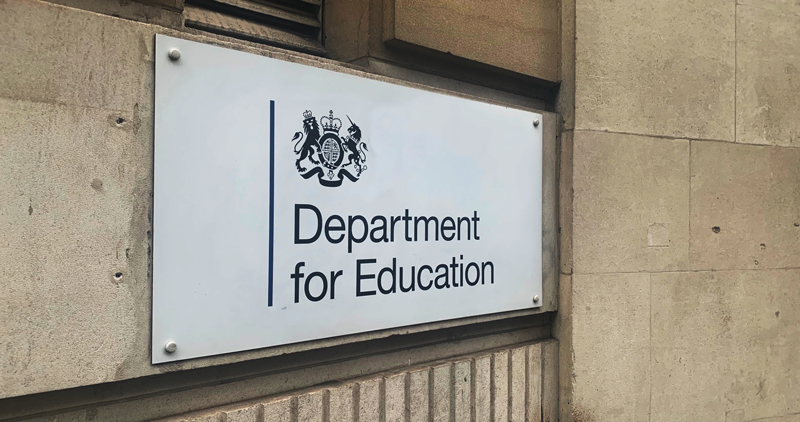Only a third of teacher training providers have been re-accredited after the first round of the government’s controversial review of the sector.
Under reforms announced last year, all initial teacher training (ITT) providers have to apply for re-accreditation to continue providing training from 2024.
The Department for Education announced today that just 80 providers had made the cut in round one, which closed in February.
It is understood that 216 providers applied for re-accreditation in the first round. There were around 240 currently operating in England as of last year.
While the government anticipated the reforms would disrupt the market, the numbers seem particularly low – and threaten to excerbate current recruitment woes.
The DfE said those that did not apply in round one were encouraged to do so in round two, which opens next week. But they have also hinted there may be future accreditation rounds “if required”.
Unsuccessful organisations given ‘feedback’
In guidance issued today, the department said snubbed applicants had been given feedback to “help them understand the areas they need to address”.
Those re-applying will “only need to respond to questions where they were below the required standard in round one”.
And applicants that do not want to re-apply are “encouraged to partner with newly accredited providers ready to deliver ITT from 2024”.
Schools minister Robin Walker said it was “vital that trainee teachers are provided with the best, most comprehensive support possible”.
“The 80 providers accredited to this point will meet that high standard and I look forward to more great quality provision being accredited as we move through the second round.”
He encouraged those which had not yet been accredited to continue through the second round “so that together we can continue to develop and grow teacher training in this country, which in turn will help level up education for all”.
‘Costly and unnecessary process’
James Noble-Rogers, chief executive of the Universities Council for the Education of Teachers, said he was “surprised that the process has not apparently allowed for the large majority of providers to secure re-accreditation from the DfE for their ITT programmes”.
“The accreditation process has, in our view, been a costly, unnecessary, disruptive and time-consuming process that has yielded no benefits and has served only as an unnecessary distraction for our members.”

Emma Hollis, from the National Association of School-Based Teacher Training, said it was “important to stress that we are only part-way through the process and as such no provider has been counted out”.
She said her organisation “remained confident” based on “assurances” from the DfE that there was “no pattern or preference emerging in the accreditation process for size and scale of provider – a fear expressed by many”.
“We are also confident that the government at large will want to avoid a potentially catastrophic risk to the teacher supply chain – and quality and availability of provision – which would come from losing significant numbers of providers from the market.”
DfE to review more curriculum materials
Providers that were successful in being re-accredited will now move on to stage two of the ITT review process. Guidance published today states stage two is “designed to be a supportive follow-up phase to stage 1”.
As part of this, the DfE said it would review a “small selection of additional, developed curriculum materials”, as well as providers’ “continued progression in developing those new areas”.
This will be done to identify providers “who may benefit from additional support ahead of Autumn 2024 ITT delivery”.
The DfE said the materials review would be a “light-touch quality assurance and triage process”, and involve the checking of materials against the new ITT core content framework.
But the guidance also warned that the government reserves the right to review the accredited status of any provider that is “unable to satisfy DfE at any point during the stage 2 process”.
The department also said it was creating a team of “provider relationship managers” to act as the “key point of contact between providers and the department”, as well as a team of “ITT associates” to support providers in stage 2.
Teacher trainers that were successful in the first round will receive requests for curriculum materials on October and must submit them by November, while those who accredit in the second round will receive the requests in December with a deadline in January.
Providers will also have to send financial information to the government to “support
DfE’s understanding of funding models in the sector”.
















This seems totally inappropriate to me. We’ve got a shortage of teachers and the last thing we want to do is to lose the expertise that exists in the ecosystem of teacher training. It’s at times like these that I agree with the ‘small-state’ right-wingers: Your nation’s government should not be interfering to this extent. Who is making these accreditation decisions in Whitehall? Is it junior civil servants with little to no experience of what teacher training involves? If this was really a liberal government they would step back and let successful providers get on with the job of recruiting sufficient people to staff our schools. It’s a nonsense that courses recently graded ‘outstanding’ by Ofsted didn’t get through round one. This is not neoliberalism and letting the free market happen, assuming that’s what one thinks is desirable. I fear it’s something much worse, as it looks like deliberate vandalism designed to fight a war on ‘woke’ universities by deciding what they should teach.